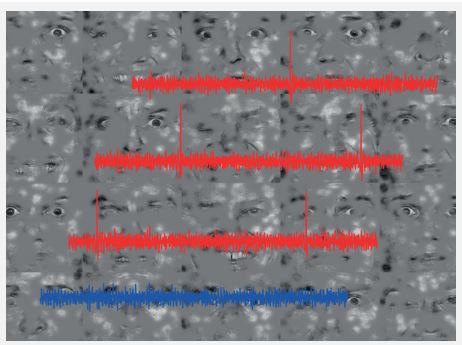People With Autism Pick Up More Information From the Mouth Than From the Eyes
[Source: LA Times]

The eyes may be the mirror of the soul, but for those with autism, the mouth will have to do.
Researchers at Cedars-Sinai Medical Center isolated neurons in the brain’s amygdala that respond to facial expressions, and tested patients with autism against those without. Both groups could correctly identify a “happy” or “fearful” face, a function long associated with the amygdala.
But when the researchers examined which neurons fired in relation to areas of the face, they found that those with autism “read” the information from the mouth area more than from the eyes and seemed to be lacking a population of nerve cells that respond only to images of eyes.
Eye contact has been shown to be crucial for social interaction. People who are on the autism spectrum tend to exhibit deficits in social behavior, including avoiding eye contact and focusing on the mouth.
The researchers from Cedars, Caltech and Huntington Memorial Hospital examined patients who already had electronic probes inserted into their brains as part of diagnostic procedures for surgery to treat epilepsy — a disorder that also is centered in the region of the brain that includes the amygdala.
Two of those patients also had been diagnosed with autism spectrum disorder. Their data were compared with that of others who had no autism symptoms.
But when the researchers examined which neurons fired in relation to areas of the face, they found that those with autism “read” the information from the mouth area more than from the eyes and seemed to be lacking a population of nerve cells that respond only to images of eyes.
Eye contact has been shown to be crucial for social interaction. People who are on the autism spectrum tend to exhibit deficits in social behavior, including avoiding eye contact and focusing on the mouth.
The researchers from Cedars, Caltech and Huntington Memorial Hospital examined patients who already had electronic probes inserted into their brains as part of diagnostic procedures for surgery to treat epilepsy — a disorder that also is centered in the region of the brain that includes the amygdala.
Two of those patients also had been diagnosed with autism spectrum disorder. Their data were compared with that of others who had no autism symptoms.
PediaStaff is Hiring!
All JobsPediaStaff hires pediatric and school-based professionals nationwide for contract assignments of 2 to 12 months. We also help clinics, hospitals, schools, and home health agencies to find and hire these professionals directly. We work with Speech-Language Pathologists, Occupational and Physical Therapists, School Psychologists, and others in pediatric therapy and education.
